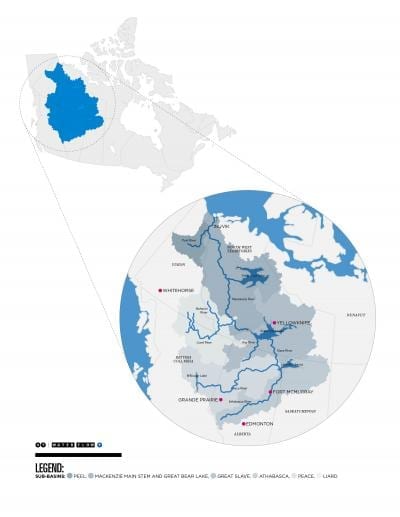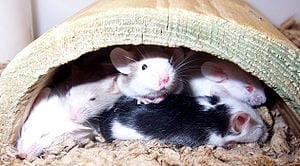
Fund recommended to hedge against greatest threat: a breached oil sands tailing pond; Biodiversity in watershed covering roughly 20% of Canada compared to Africa’s Serengeti;
Alarm raised at melting of permafrost, ice that plays vital global climate role
Canada’s Mackenzie River basin — among the world’s most important major ecosystems — is poorly studied, inadequately monitored, and at serious risk due to climate change and resource exploitation, a panel of international scientists warn today.
In a report, nine Canadian, US and UK scientists convened by the US-based Rosenberg International Forum on Water Policy, say effective governance of the massive Basin, comprising an area three times larger than France — holds enormous national and global importance due to the watershed’s biodiversity and its role in hemispheric bird migrations, stabilizing climate and the health of the Arctic Ocean.
The panel agreed the largest single threat to the Basin is a potential breach in the tailings ponds at one of the large oil sands sites mining surface bitumen. A breach in winter sending tailings liquid under the ice of the tributary Athabasca River, “would be virtually impossible to remediate or clean-up,” says the report, available in full at http://bit.ly/13gc01K
“Extractive industries should be required to post a substantial performance bond which would be used to cover the costs of site clean-up should the enterprise fail financially or otherwise fail to fully remediate damage and destruction at the site in question,” the report says. “The performance bond should be secured prior to site development and the commencement of operations.”
Importance of the MacKenzie Basin (maps: http://bit.ly/T3zS2Q and http://bit.ly/1aVZTIt)
Researchers have compared the Mackenzie Basin to Africa’s Serengeti Plain, an area of comparable size. Both ecosystems harbour high biodiversity and biological productivity compared to others in their respective regions. There are some 45,000 biologically productive lakes in the Mackenzie Basin.
Meanwhile, the ice and snow cover in the Mackenzie Basin provides a vital refrigerator-like cooling role, in weather and climate patterns throughout the northern hemisphere.
University of California Prof. Henry Vaux, Chair of the Rosenberg Forum, stressed that the average temperature in the Basin has already warmed beyond the 2 degree Celsius upon which nations agreed in Copenhagen as a limit not to be surpassed.
And, he noted, the World Meteorological Organization (2012) reported that ice cover in the Arctic between March and September of 2012 had been reduced by an area of 11.83 million square kilometers.
“To put that in perspective, Canada is about 10 million square kilometers in area; the area of Arctic sea ice that melted last summer was almost 2 million square kilometers larger,” says Dr. Vaux.
The report, based on hearings conducted in Vancouver Sept. 5 to 7 last year, supported by the Walter and Duncan Gordon Foundation, says warm air now arrives in the north earlier in the spring and often persists longer into the autumn.
The Mackenzie Basin helps moderate climate by capping hundreds of millions of tonnes of greenhouse gases in permafrost soils, which cover 20% of the Earth’s surface. Deep permafrost — in some places two kilometres deep — can take 100,000 years to form.
In regions like the Mackenzie Basin, however, where average annual temperature is only slightly below freezing, permafrost is much thinner. Its melting will release massive quantities of methane (a greenhouse gas 21 times more potential per molecule than CO2) into the atmosphere.
Rising Arctic temperatures are already affecting the hydrological cycle of the Northwest Territories and other parts of Canada “and all signs indicate these changes will accelerate over time,” according to the report.
Glacier coverage has declined by approximately 25 per cent in the last 25 years and in spring snow cover in the Canadian Rockies disappears about one month earlier.
Though these changes are already significant, “and in some cases border on catastrophic,” the report says, climate simulations suggest increased warming will lead to even higher temperatures of a level not seen on Earth in more than 10,000 years. “Most participating stakeholders believe the region could adapt if the changes occur slowly,” says the report. “However, rapid warming will make adaptation considerably more difficult.”
“If vegetation and wildlife patterns are modified by climate change, then indigenous peoples’ subsistence lifestyles are at risk. The effect of long-term climate change on communities, however, will also be determined by other factors, including lifestyle choices made by the region’s inhabitants. Although socio-economic patterns and determinants are not well understood, it is possible that subsistence lifestyles will not be feasible in the future.”
Though the total number of Arctic people living on substance lifestyle is unknown, it is estimated that about 30% of people in Canada’s Northwest Territory (population: 42,500) have a diet that includes at least 50% “country food.”
Says the report: “The Mackenzie River appears to be less well studied than most other major rivers of the world,” and threats beyond warming temperatures include “unrestrained development, lack of attention to environmental protection and a lack of will to acknowledge and recognize the lifestyles of the Basin’s indigenous peoples.”
The Latest Bing News on:
Mackenzie River Basin
- Open Fire Season For Hakataramea Valley And Waihaorungaon May 10, 2024 at 6:30 am
The inland high-country areas of Mackenzie Basin, Rangitata Gorge ... "The Mid-South Canterbury District is south of the Rakaia River to the Waitaki River. If you’re ever unsure if it’s okay to light, ...
- McKenzie Fire and Rescue staffing at risk unless levy passeson May 8, 2024 at 6:30 pm
McKenzie River Fire and Rescue has five fire stations, and only one is staffed by two firefighters during a given shift.That number is no ...
- Hatchery-born salmon don't pass poor breeding skills to offspring, OSU findson May 7, 2024 at 7:14 am
and hatcheries play a big role in the future survival of the threatened Columbia River Basin species. What they did: OSU researchers compiled 13 years' worth of family tree data from over 10,000 ...
- Good fishin': Summer steelhead numbers best in years for Santiam, Upper Willamette Basinon May 6, 2024 at 10:37 am
The number of hatchery summer steelhead returning to the Upper Willamette Basin and Santiam rivers could mean the best fishing in a decade.
- Looking for an Unexpected Place to Glimpse the Milky Way? Try Nebraska.on May 5, 2024 at 8:59 pm
From ancient rock formations to tranquil rivers under the stars, Nebraska's dark skies offer a stellar experience a bit closer to home.
- McKenzie River National Recreation Trail reopens following trail bridge constructionon May 2, 2024 at 5:10 pm
The Forest Service announced the McKenzie River National Recreation Trail and its trailheads are open for use following construction completion.
- Waitaki River search: Authorities searching for person missing from boaton April 22, 2024 at 1:28 pm
Police were notified on Monday night that a person was missing from a boat on the Waitaki.
- extended forecasts from friday night 19 april to wednesday 24 april for the great slave lake and mackenzie river areas of the noon April 18, 2024 at 7:30 am
extended forecasts from friday night 19 april to wednesday 24 april for the great slave lake and mackenzie river areas of the northwest territories issued by environment canada at 10:30 a.m. mdt ...
- Once in 'extinction vortex,' Willamette winter steelhead post best returns since 2004on April 9, 2024 at 5:03 am
The number of winter steelhead returning to the Upper Willamette Basin reached its highest ... story said winter steelhead migrate up the McKenzie River. However, native wild winter steelhead ...
- Log jam, Mackenzie River Delta in Nunavut, Canada (IMAGE)on April 11, 2023 at 1:30 pm
Scientists have mapped the world’s biggest cumulative logjam that we know of, as reported in a new study in the AGU journal Geophysical Research Letters. The woody debris stores more than 3 ...
The Latest Google Headlines on:
Mackenzie River Basin
[google_news title=”” keyword=”Mackenzie River Basin” num_posts=”10″ blurb_length=”0″ show_thumb=”left”]
The Latest Bing News on:
Mackenzie River Basin melting permafrost
- Climate and Environmenton May 8, 2024 at 3:58 am
At a private meeting at Mar-a-Lago, the former president said fossil fuel companies should donate to help him beat President Biden. By Lisa Friedman, Coral Davenport, Jonathan Swan and Maggie ...
- Mountain snow will melt soon, but not all will make it to the Colorado Riveron April 30, 2024 at 7:49 am
Colorado's Rocky Mountains have reached peak snowpack, but climate change is changing the way snow turns to water. States around the region are debating new rules for the river that center around new ...
- Water levels across N.W.T. still mostly well below average — except for the Peelon April 19, 2024 at 2:55 pm
Water levels remain low in most of the territory — except for the Peel River basin, where both water levels ... and if the ice can melt out slowly, then that'll decrease the chance of of strong ...
- Arctic waters are emitting more carbon as they continue to warmon December 21, 2023 at 12:33 pm
One of North America's largest rivers, Canada's Mackenzie River ... melting of snow and ice have caused rivers to flow more rapidly. Consequently, more organic matter from permafrost and peatlands ...
- River basin managementon October 2, 2023 at 12:07 am
Learn about physical characteristics of the Colorado River basin, including climate, rock type, soils, vegetation and river flow. Need for water management Water management is needed on the ...
- Log jam, Mackenzie River Delta in Nunavut, Canada (IMAGE)on April 11, 2023 at 1:30 pm
Scientists have mapped the world’s biggest cumulative logjam that we know of, as reported in a new study in the AGU journal Geophysical Research Letters. The woody debris stores more than 3 ...
- Melting permafrost reveals bodies of ancient Mongolians — and their diets, study sayson April 5, 2023 at 8:58 am
The area, known as the Khorig cemetery, has been excavated by archaeologists and scavenged by looters as the melting permafrost has exposed more and more of the site, researchers said. The ...
- Arctic permafrost is thawing fast. That affects us all.on March 23, 2023 at 1:58 am
Sergey Zimov, right, and his son, Nikita, run an Arctic research station in Cherskiy, Russia, along the Kolyma River. The elder Zimov first figured out that permafrost stores far more carbon than ...
- Climate Change In The Arctic: An Inuit Realityon November 21, 2022 at 6:30 pm
I live in Inuvik, well above the Arctic circle, on the Mackenzie River delta in Canada's northwest ... commonplace and cumulative changes; melting permafrost, resulting in beach slumping and ...
- Permafrost is melting in Yakutia: the ground is covered with round hillson October 22, 2021 at 3:46 am
Independent news and stories connecting you to life in Australia and Russian-speaking Australians.
The Latest Google Headlines on:
Mackenzie River Basin melting permafrost
[google_news title=”” keyword=”Mackenzie River Basin melting permafrost” num_posts=”10″ blurb_length=”0″ show_thumb=”left”]










